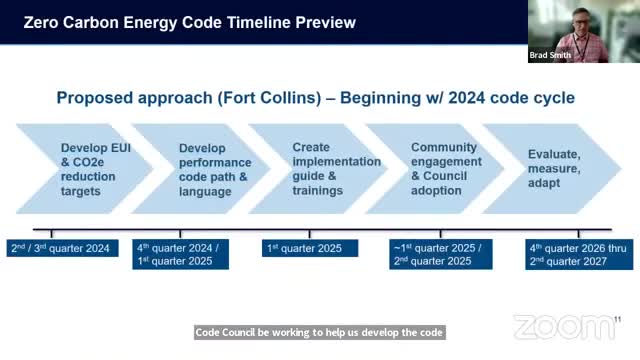Energy code overhaul aims for zero carbon buildings
July 10, 2024 | Energy Office, State Agencies, Organizations, Executive, Colorado

This article was created by AI summarizing key points discussed. AI makes mistakes, so for full details and context, please refer to the video of the full meeting. Please report any errors so we can fix them. Report an error »

In a recent government meeting, officials outlined a comprehensive timeline for the development and implementation of new energy efficiency codes aimed at reducing carbon emissions in building practices over the next two to three years. The initiative is part of a broader effort to align with the International Energy Conservation Code, with significant milestones set for the fourth quarter of this year and the first quarter of next year.
The plan includes the creation of code language that will be adopted as an appendix, followed by the development of an implementation guide and training sessions. Community engagement is also a key component, with the goal of preparing for council adoption approximately one year from the issuance of the current version of the energy code.
Officials emphasized the importance of streamlining the building services division's processes by consolidating various code paths into a single, clear framework. This change is expected to simplify the review and inspection processes for building teams, enhancing efficiency and clarity.
Data presented during the meeting highlighted the current energy use intensity in Colorado's climate zone 5b, which stands at approximately 30.7 kBtu per square foot. While this figure indicates some progress, officials acknowledged the need for further improvements to achieve a 100% renewable energy offset for buildings.
The City of Fort Collins has been actively tracking energy use in residential homes by code year, with a focus on ensuring that each new code cycle results in reduced energy consumption. Current analyses extend through 2018, with ongoing efforts to update data for 2021.
Overall, the meeting underscored a commitment to advancing energy efficiency standards and fostering sustainable building practices in Colorado, with a clear roadmap for the future.
The plan includes the creation of code language that will be adopted as an appendix, followed by the development of an implementation guide and training sessions. Community engagement is also a key component, with the goal of preparing for council adoption approximately one year from the issuance of the current version of the energy code.
Officials emphasized the importance of streamlining the building services division's processes by consolidating various code paths into a single, clear framework. This change is expected to simplify the review and inspection processes for building teams, enhancing efficiency and clarity.
Data presented during the meeting highlighted the current energy use intensity in Colorado's climate zone 5b, which stands at approximately 30.7 kBtu per square foot. While this figure indicates some progress, officials acknowledged the need for further improvements to achieve a 100% renewable energy offset for buildings.
The City of Fort Collins has been actively tracking energy use in residential homes by code year, with a focus on ensuring that each new code cycle results in reduced energy consumption. Current analyses extend through 2018, with ongoing efforts to update data for 2021.
Overall, the meeting underscored a commitment to advancing energy efficiency standards and fostering sustainable building practices in Colorado, with a clear roadmap for the future.
View full meeting
This article is based on a recent meeting—watch the full video and explore the complete transcript for deeper insights into the discussion.
View full meeting
